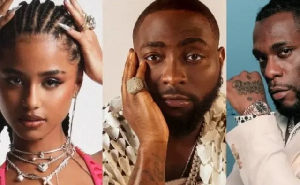Opinions of Monday, 17 August 2020
Columnist: guardian.ng
Walter Carrington: An astute fighter in Nigeria’s hazardous journey
As long as the story of Nigeria’s return to democratic rule is told, the role played by the former United States Ambassador to Nigeria, Walter Carrington, who passed away at the ripe age of 90 years on Tuesday, August 11, 2020, cannot be forgotten. Nigeria regained democratic freedom in 1999 after a long period of military regimes that ushered in the dark days of two former Heads of State, Generals Ibrahim Babangida and the late Sani Abacha,
To acknowledge Carrington’s role in Nigeria’s return to democratic government and his unflinching support for the realisation of late Chief M.K.O Abiola’s presidential mandate, believed to have won the 1993 presidential election annulled by Babangida, one of the most prestigious streets in upscale Victoria Island of Lagos was named after him. Not just that former, President Olusegun Obasanjo once renamed Carrington as Omowale, a Yoruba name meaning ‘the child who has returned.’ This was specifically to commend the late American envoy for his well-known stance against human rights violations and anti-democratic tendencies under the late Abacha’s regime. He was indeed a son of the soil who had returned to challenge the status quo.
To identify with Nigeria’s culture, Carrington, during his stay in the country (1993 to 1997), married Arese, a Benin lady from Edo State with whom he spent the rest of his life until he passed on recently.
Born on July 24, 1930 in New York City to an immigrant father from Barbados, Carrington was raised in a predominately Italian-Irish community and was vice president of his class throughout his four years at the predominantly white Parlin Junior High and Everett High School. After he graduated in 1948, Carrington became one of four black students at Harvard University, who founded the first Harvard chapter of the National Association for the Advancement of Coloured People. He was the first student elected to the National Board of Directors of National Association for the Advancement of Coloured People (NAACP).
He practised law in Massachusetts and served on the three-member Massachusetts Commission Against Discrimination, becoming, at the age of 27, the youngest person to be appointed a commissioner in the state’s history. While there, he was in charge of the case, which led to the Boston Red Sox, the last remaining all-white Major League Baseball Team, hiring its first black player.
In 1952, Carrington was elected NAACP’s Youth Council delegate to Senegal. Carrington organised for John F. Kennedy in 1960. In 1961, he came to Africa as one of the first overseas Directors of Peace Corps. He eventually became Peace Corps’ director for Africa. In 1967, he had the responsibility of evacuating young Americans as Biafran troops were advancing towards Benin City. He then served as Executive Vice President of African-American Institute from 1971 to 1979 and was also a member of Africare.
In 1980, Carrington served President Jimmy Carter as Ambassador to Senegal. In 1981, he was named Director of Department of International Affairs at Howard University. He also taught at Marquette University, Massachusetts Institute of Technology and Washington College, and from 1990 to 1991, acted as a consultant at the Joint Center for Political and Economic Studies. President Bill Clinton appointed him US Ambassador to Nigeria in 1993 and he arrived in Lagos a few months after the annulment of the June 12 election, subsequently opposing the abuses of Nigerian Head of State, General Sani Abacha.
He criticised Abacha’s regime, and campaigned vigorously for a return to democracy in Nigeria. Carrington rallied the diplomatic corps against the regime’s abuse of human rights and brutalisation of Nigerians, especially critics and pro-democracy activists. He went beyond diplomatic remits in his engagement with the Abacha regime and the struggle for military disengagement and enthronement of democratic government. Although his tenure ended in 1997, Carrington showed interest in the affairs of Nigeria till his last days on earth.
From 1997 to 1998, and again in 1999, Carrington worked as a fellow of Harvard University’s W.E.B. DuBois Institute. He was also a MacArthur Fellow in 1998. In 2004, he was named the first African-American Warburg Professor of International Relations at Simmons College in Boston.
While euologising Carrington’s virtues and how he helped secure civil rule in Nigeria, national leader of All Progressives Congress (APC), Asiwaju Bola Tinubu recounted the envoy’s contributions to the growth of democracy in the country.
In a tribute Tinubu titled: ‘Citizen of One Nation, Son of Two,’ the former governor of Lagos State said Carrington “openly and unconditionally championed the advent of democratic freedom and constitutional governance in the country.”
Tinubu expressed gratitude to God for giving Nigeria Walter Carrington during the Abacha period, saying, Carrington came to Nigeria on a diplomatic assignment, but his true mission was even more sublime.
According to Tinubu, “Walter was both an African and an American. This identity he knew full well, for it shaped who he was and guided what he did. The best of both worlds was evident in him. This man may have been the citizen of one country but he was surely the brave and passionate son of two nations.
“Last month, I penned a tribute to Ambassador Carrington as Nigeria joined him in celebrating his 90th birthday. Little did any of us know that we would so soon have to say farewell to this outstanding example of courage amidst humility, of intellect teamed with compassion.
“Walter Carrington was a renowned scholar, author, and astute, innovative diplomat. These things are excellent, but they don’t tell the full picture. He was much more than that. He was a proud and noble black man who stood up for his convictions when it would have been easier to simply turn and look the other way.”
Tinubu further commended the late American diplomat for having the courage to live with Nigerians and also identify with the country during a troubled and uncertain time.
According to Tinubu, “We were in the clutches of an epic battle between democracy and dictatorship, between freedom and oppression, between enlightened progress and authoritarian reaction. Carrington could have maintained a diplomatic distance. He could have acted cozily with the Abacha regime. His life would have been less difficult and safer. But he eschewed personal comfort for the higher prize of a greater mission.
“He lent himself to the fight against repressive government. He openly and unconditionally championed the advent of democratic freedom and constitutional governance.”
He noted that without the courage and contributions of Carrington, “perhaps democracy might not have come when and as it did. Certainly, more of our democracy activists would have suffered and perhaps lost their lives but for his extraordinary intervention.”
In another tribute, the National Consultative Front (NCFront) also mourned Carrington, who it described as an unwavering associate and honorary patron. Declaring the late envoy a hero of Nigeria’s Democracy, NCFront’s Head, Public Affairs Bureau, Dr. Tanko Yunusa said Carrington greatly identified with Nigerian progressive democrats during the struggle for the restoration of the current democratic dispensation in Nigeria.
NCFront said, “He was a friend of the oppressed, who believed in the capacity of human beings of all races to govern themselves. He had an abiding faith in the capacity of all human beings – black or white, Jews, Hebrews, Caucasian, Africans, Asians and all races, to decide on who and how to be governed.
“Carrington spent the earlier part of his life in the black renaissance movement for general adult suffrage in the United States and was an unforgettable ally of the pro-democracy groups in Nigeria, publicly associating himself and encouraging his country to align with the struggle for democracy in Nigeria, during the brutal dictatorship of General Sani Abacha, even to the point of putting his own life at risk.”
The group noted that the former diplomat did not only stand up for freedom in Nigeria during the cruel years of military dictatorship, but was until his death a civil rights activist, who supported the democratization of the Nigerian public space and the ideals and values, which the NCFront is presently advancing for the redemption of the country. It noted how Carrington so much loved Nigeria, such that he adopted it as his country.
“NCFront fondly recalls his last engagement with us when he delivered a keynote address at a virtual symposium organised by the June 12 Pro-democracy Movement of Nigeria to commemorate this year’s June 12 anniversary celebration, a gathering which also marked the birth of the NCFront consultative convergence in Nigeria,” the group said.
In a similar vein, President, Women Arise & Centre for Change, Dr. Joe Okei-Odumakin, said there are so many things Nigerians would forever remember Carrington for.
According to her, “The first was his skin: He was black as black could be, being a Black American or African-American, as Jesse Jackson, another notable American of African descent, taught us to call it. Carrington was perhaps the first black skin to be America’s ambassador in Africa’s most populous Black country. He was an ambassador, who did not act ambassadorial but mixed with the hoi polloi. He had no airs, but moved in both low and high circles, taking in the whole essence of the Nigerian society.”
She added that Carrington was in Nigeria at perhaps the most critical period of its country’s political history: The struggle to end military dictatorship and return the country to democratic governance.
“He minced no words in speaking out for civil liberties” she said. “He left no one in doubt that he was making his stand with the people. In this, he stepped on powerful toes; he drew the ire of military goons and was at the receiving end of their viciousness.
“We will not forget how soldiers, armed to the teeth, stormed the venue in Lagos where National Democratic Coalition (NADECO) and Campaign for Democracy (CD) had gathered to hold a send-forth party for him.”














